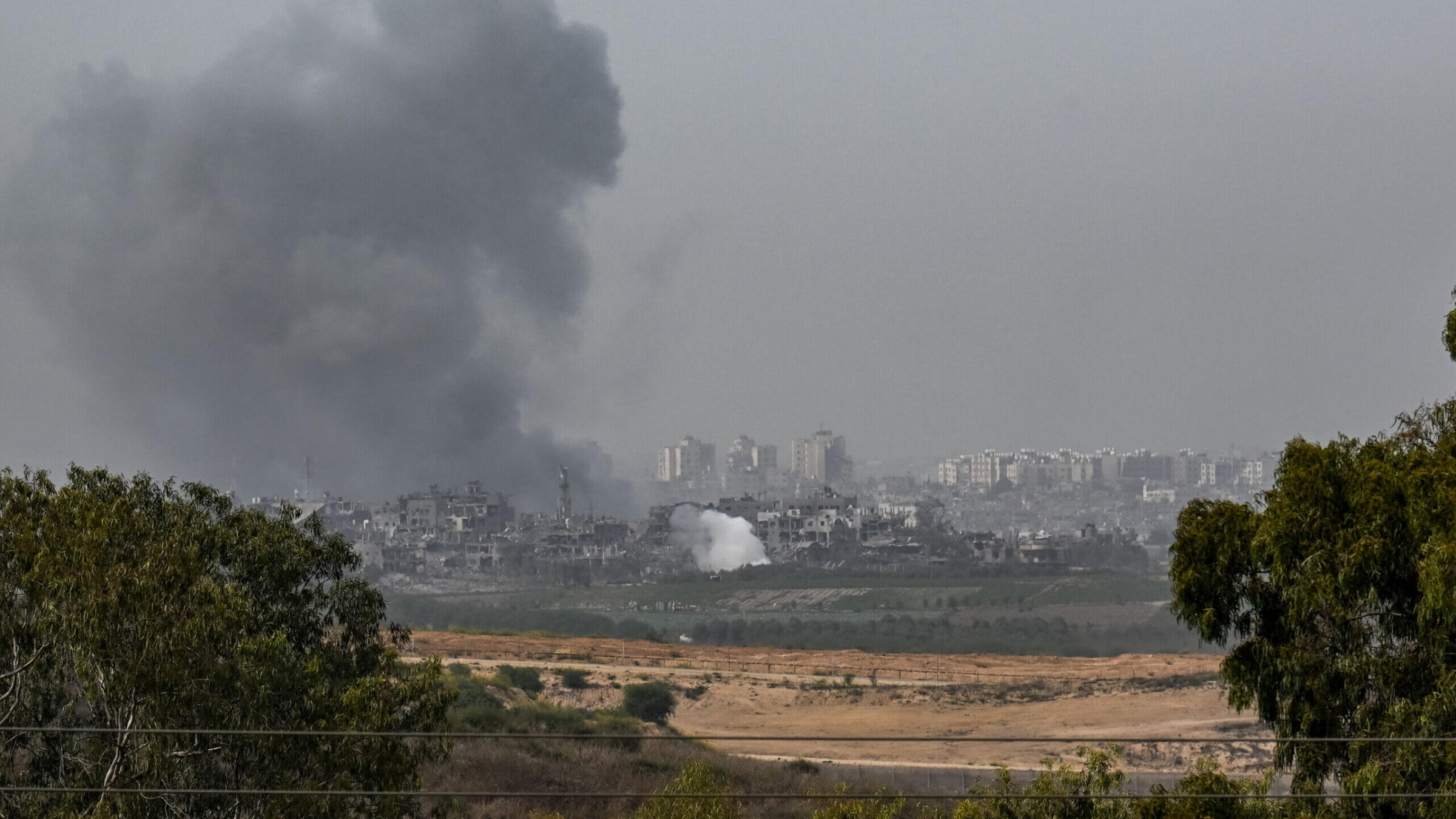‘This is our second independence war,’ Netanyahu declares as Israeli troops battle inside Gaza
U.N. says Gaza residents broke into storehouses to get basic supplies as humanitarian crises deepens

An incoming Israeli military strike on buildings in Gaza City Sunday. Photo by Alexi J. Rosenfeld/Getty Images
Prime Minister Benjamin Netanyahu told Israelis Saturday night that “this is our second independence war,” as troops battled on the ground inside the Gaza Strip in what he and other members of his war cabinet described as the war’s “second phase.”
It was unclear how many tanks and soldiers had entered Gaza or when more would come, but the Israeli military reissued its warning to Gaza residents to evacuate the northern part of the coastal enclave, and reported that two soldiers had been wounded in the ground battle.
“The war inside Gaza will be long and difficult — and we are ready for it,” Netanyahu said in a televised address. “This is our second independence war. We will fight to protect our country. We will fight on land, in the sea and in the air. We will destroy the enemy above ground and underground.”
Meanwhile in New York, thousands of pro-Palestinian activists marched across the Brooklyn Bridge Saturday and rallied in front of the Brooklyn Museum, chanting “Free, free Palestine” and “Let Gaza live!”
The Hamas-run Gaza health ministry said Sunday the death toll had passed 8,000 from Israel’s retaliatory strikes since the Oct. 7 terror attack in which Islamist militants killed more than 1,400 Israelis and kidnapped about 220. The United Nations Relief and Works Agency, which supports the 80% of Gaza residents classified as Palestinian refugees, described an increasingly desperate humanitarian crisis in which its storehouses had been ransacked of foodstuffs.
“The situation in Gaza is growing more desperate by the hour,” U.N. Secretary General Antonio Guterres said Sunday during a visit to Nepal. “I regret that instead of a critically needed humanitarian pause, supported by the international community, Israel has intensified its military operations.”
The Times of Israel reported Sunday that Israel had reopened the second of three water pipelines to Gaza, allowing about 28.5 million liters a day to flow into the enclave. That is more than half the flow of 49 million liters a day before the war.
An Israeli spokesman said the pipelines typically provide about 9 % of Gaza’s water. Humanitarian aid groups have said the water crisis stems largely from the shortage of fuel to run desalination plants; Israel has not allowed fuel into Gaza for fear it will be abused by Hamas. The New York Times reported Friday that Hamas has stockpiled food and fuel as well as weapons in its massive network of underground tunnels.
Israel also continued to battle threats on its northern border, striking targets in Lebanon the Israel Defense Forces said belonged to the Shiite militia Hezbollah, which has fired a small but steady number of missiles at Israel throughout the three-week war. Foreign journalists were invited to tour the north on Monday.
Netanyahu, taking questions from reporters for the first time since the war began, acknowledged the gaps in military intelligence that allowed for the unprecedented assault by Hamas three weeks ago.
“After the war, everyone will need to give answers to hard questions, including me,” he said Saturday night. “There was a horrible failure, and it will be fully checked. I promise you, no stone will be left unturned.”
Hours later, Netanyahu appeared to be trying to escape culpability, with a post on X — formerly Twitter — that was later deleted. “At no stage” was the prime minister “warned of war intentions on the part of Hamas,” the post said. On the contrary, the assessment of the entire security echelon, including the head of military intelligence and the head of Shin Bet, was that Hamas was deterred and was interested in an arrangement.”
After an uproar from Israeli analysts and politicians including members of his own war cabinet, Netanyahu deleted the post on Sunday and replaced it with an apology that said he fully backs the security services
A message from our CEO & publisher Rachel Fishman Feddersen
I hope you appreciated this article. Before you go, I’d like to ask you to please support the Forward’s award-winning, nonprofit journalism during this critical time.
We’ve set a goal to raise $260,000 by December 31. That’s an ambitious goal, but one that will give us the resources we need to invest in the high quality news, opinion, analysis and cultural coverage that isn’t available anywhere else.
If you feel inspired to make an impact, now is the time to give something back. Join us as a member at your most generous level.
— Rachel Fishman Feddersen, Publisher and CEO